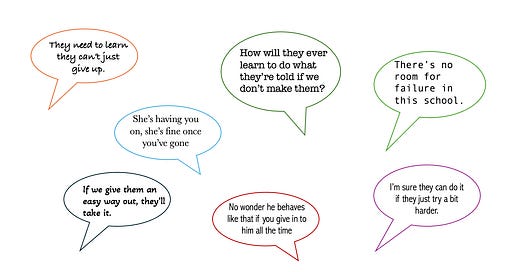There’s something strange about the way we think about children in our society.
Underpinning so much of what we do is the idea that if we let them get away with it, they’ll be lazy and they’ll never do anything difficult.
Not only will they be like that now, but they’ll never learn to be any different. We think we have to make our children continue with swimming lessons they hate, in case they don’t turn up to work in adulthood. We think we have to make them read every day despite their protests, in case they don’t ever develop a work ethic. We have to stop them playing to sit them down and insist that their immature hands hold a pencil. We tell them in so many ways that the things they value are less important than what we value, and that we are always right.
Alongside this goes the idea that children are out to manipulate us. We’re told that they’ll say they are unhappy when really they are fine, in order not to go to school. That they’ll throw ‘tantrums’ to get their own way, or make up things to ‘just for attention’. That if we listen to them we are ‘letting them have their own way’ and that this a parenting fail. We drop them off at the school gate begging us not to leave them, and school says ‘They’re fine once they’re here’.
It's like we’ve lost touch with the idea that children are humans. Full of drive and curiosity, until you stop them from exploring and tell them it doesn’t matter what they think. Always trying out new things and challenging themselves, until we tell them that the things which have meaning to them don’t matter, and what matters is spelling and doing your times tables really fast.
Under this onslaught, it shouldn’t be surprising when some of them just can’t do it anymore. When they lose their spark for life and their bounce. When they just can’t do life anymore, even things that should be fun. It’s as if everything stops.
We don’t talk much about burnout in primary school age children, but I’ve been thinking about it a lot recently because parents have been asking. I’ve written a new webinar on it, in fact.
What is it, why does it happen and how can parents help? Come to my new webinar to find out more. Aimed at parents of the under-12s. It is recorded
.





Dear Naomi, thank you for sharing this. I believe it points towards truly connecting with children, really listening to them and their needs, rather than thinking, "This is how it should be."
Childhood is a crucial journey for developing self-confidence and a fundamental sense of trust in the world and in your ability to feel safe. Play, exploration, and nurturing curiosity are immensely important for this, as you wonderfully pointed out.
Yes, children are humans! However, especially in education, we too often treat them as almost-human or soon-to-be-human, using that as a justification to take away their basic rights. Would you want to be treated like that??